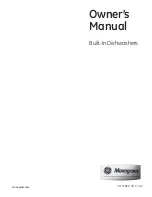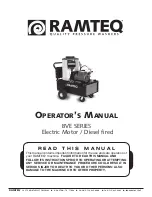
6
Wash/Rinse temperature not what I selected
Are the hot and cold water inlet hoses reversed?
See the
Installation Instructions for more information. As your
frequency of loads washed increases, the water temperature
may decrease for hot and warm temperatures. This is normal.
Did you select a Warm/Warm temperature setting?
On
models without ACCUWASH automatic temperature control
that do have a Warm/Warm temperature selection, the warm
wash will be followed by an energy saving cold rinse followed
by warm spray rinses. This saves energy while providing an
effective rinse performance.
Washer Results
Load too wet
Did you use the right cycle for the load being washed?
Select a cycle with a higher spin speed (if available).
Did you use a cold rinse?
Cold rinses leave loads wetter than
warm rinses. This is normal.
Residue or lint on load
Did you sort properly?
Sort lint givers (towels, chenille) from
lint takers (corduroy, synthetics). Also sort by color.
Did you overload the washer?
The wash load must be
balanced and not overloaded. Clothes should move freely. Lint
can be trapped in the load if overloaded. Wash smaller loads.
Did you select the correct water level?
The water level
should be correct for the load size. Clothes should move freely
in the water.
Did you use enough detergent?
Follow manufacturer’s
directions. Use enough detergent to hold the lint in the water.
Did you line dry your clothing?
If so, you can expect some
lint on the clothing.
Check the following:
Was paper or tissue left in the pockets?
Is your water colder than 21˚C? Wash water colder than
21˚C may not completely dissolve the detergent.
Did you use the proper cycle time for the load? Reducing
wash time (duration) is another way to reduce lint.
Stains on load
Did you follow the manufacturer’s directions when adding
detergent and fabric softener?
Measure detergent and
fabric softener. Use enough detergent to remove soil and hold
it in suspension. Dilute fabric softener and add to the rinse
portion of a cycle only. Do not drip fabric softener on clothes.
Is there above average iron (rust) in water?
You may need
to install an iron filter.
Did you properly sort the load?
Sort dark clothes from
whites and lights.
Did you unload the washer promptly?
To avoid dye transfer,
unload the washer as soon as it stops.
Load is wrinkled
Did you unload the washer promptly?
Unload the washer as
soon as it stops.
Did you use the right cycle for the load being washed?
Use the cycle for Casual or Permanent Press clothes or
another cycle with low spin speeds (if available) to reduce
wrinkling.
Did you overload the washer?
The wash load must be
balanced and not overloaded. Loads should move freely
during washing.
To reduce wrinkling of permanent press clothes and some
synthetic knits, use a large load size to provide more space.
Was the wash water warm enough to relax wrinkles, or are
you using warm rinses?
If safe for the load, use warm or hot
wash water. Use cold rinse water.
Are the hot and cold water hoses reversed?
Check to be
sure the hot and cold water hoses are connected to the right
faucets. See the Installation Instructions.
Load is tangled or twisted
Did you overload the washer?
The wash load must be
balanced and not overloaded. Loads should move freely
during washing.
Did you wrap items around the agitator?
Drop items loosely
into the washer. Do not wrap items around the agitator.
Gray whites, dingy colors
Did you properly sort the load?
Dye transfer can occur when
mixing whites and colors in a load. Sort dark clothes from
whites and lights.
Was the wash temperature too low?
Use hot or warm
washes if safe for the load. Make sure your hot water system
is adequate to provide a hot water wash.
Did you use enough detergent, or do you have hard water?
Use more detergent for washing heavy soils in cold or hard
water.
Are the hot and cold water hoses reversed?
Check to be
sure the hot and cold water hoses are connected to the right
faucets. See the Installation Instructions.
Garments damaged
Check the following:
Were sharp items removed from pockets before washing?
Empty pockets, zip zippers, snap or hook fasteners before
washing.
Were strings and sashes tied to prevent tangling?
Were items damaged before washing? Mend rips and broken
threads in seams before washing.
Did you overload the washer?
The wash load must be
balanced and not overloaded. Loads should move freely
during washing.
Did you add chlorine bleach properly?
Do not pour chlorine
bleach directly onto load. Wipe up bleach spills. Undiluted
bleach will damage fabrics. Do not place load items on top of
the bleach dispenser when loading and unloading the washer
(on some models).
Did you follow the manufacturer’s care label instructions?






























